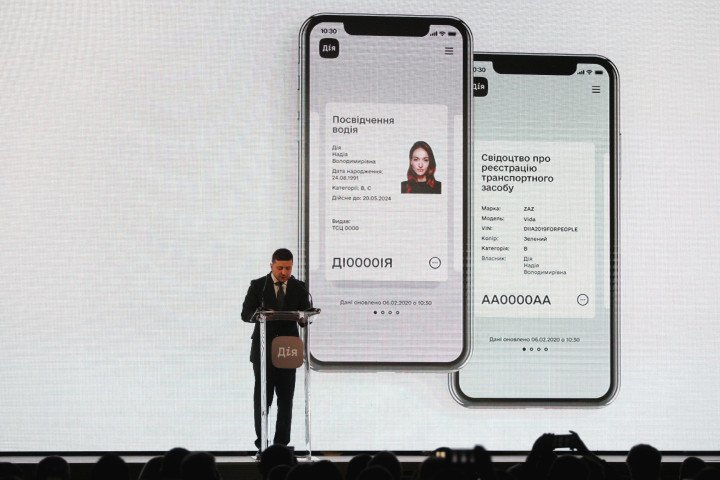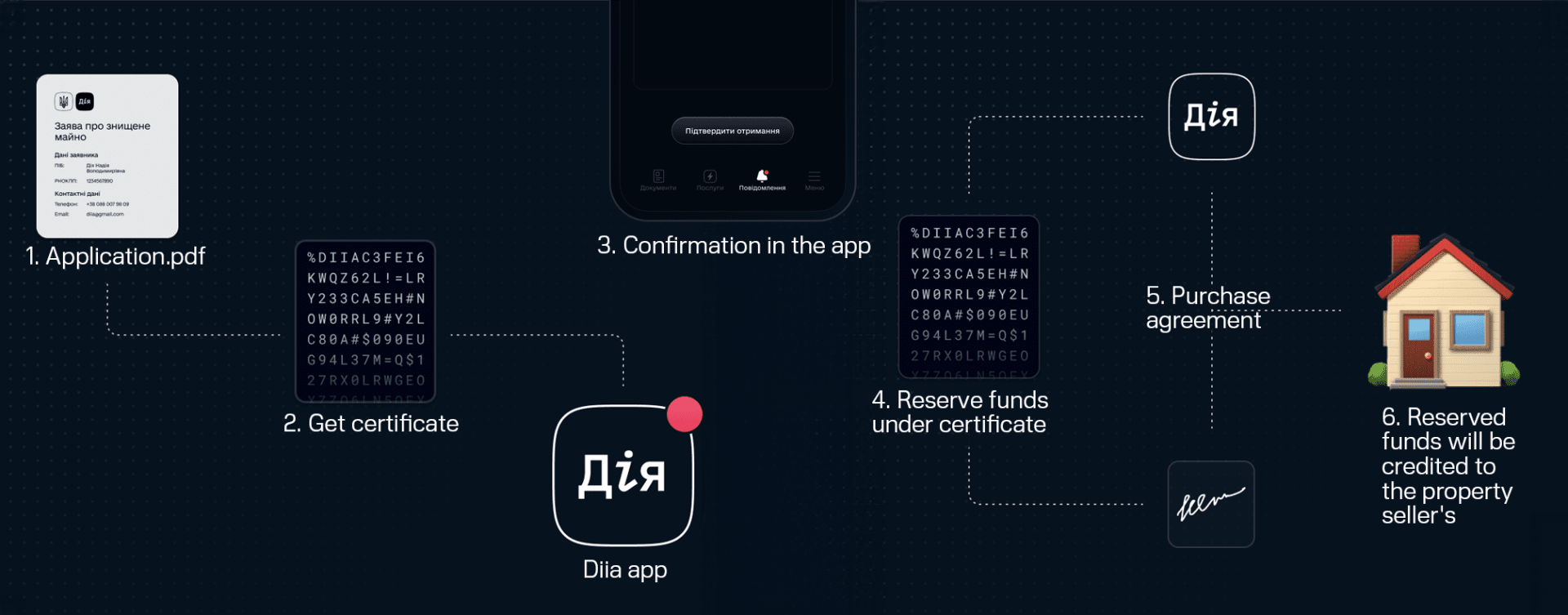- Category
- Business
Why Ukraine Is a Digital Public Service Powerhouse, Even Amid War

In just six years, Ukraine has surged from 102nd to 5th place globally in digital public services—all while enduring relentless Russian attacks. But how did a nation at war transform into a leader of the digital revolution?
“A lot of credit goes to Ukraine’s leadership,” Ieva Ilves, former First Lady of Estonia and international advisor on cybersecurity to Ukraine’s Digital Transformation Ministry, told us. “You really saw the acceleration of digital Ukraine with the current government stepping in. Ukraine would not be able to hash it up now when you have active invasion war if you had not prepared the background.”

Diia: government in your pocket
At the heart of the Ukrainian digital revolution is the Diia platform—“the state in a smartphone.” Launched in 2019, Diia offers services like digital passports, tax payments, and business registration. During the COVID-19 pandemic, it helped Ukrainians find vaccination points, and during Russia’s full-scale invasion, it became essential for millions of internally displaced people, helping them find housing and access crucial services.
From eMarriage, which allows couples to wed online, to eRecovery, which helps citizens receive funds for war-damaged property, Diia is transforming everyday life.
“The very core of being digital is serving people,” says Ilves. “Ukraine gives money earmarked for reconstruction services and gives a free market to everybody who can deliver this service.
The state does matchmaking for those who need the service and those who can provide it. Whether it is an individual plumber or a big construction company—they can register themselves in Diia. A citizen who already has a difficult life has a very simplified version to file, get money, and spend money on housing. The state has outstanding transparency and reliability that money is not abused. It’s a win-win for everybody—for those who provide the support and for the citizens.”

The platform keeps evolving in 2024. New services include an updated Map of Invincibility, showing access to shelters, tools for sailors to obtain certification documents, and more. For entrepreneurs, Diia now offers automated business services, with Diia.Business supporting small and medium enterprises while Diia.City provides a legal framework for IT companies.
Diia.Education aims to provide up-to-date learning for all, children and adults alike, with the Mriya app personalizing education with AI, streamlining school management, and digital student Mriya-ID. It will launch by the end of the academic year, with nationwide rollout plans.
Casually called “Diia for the military” Army+ and Reserve+ apps are now streamlining Ukraine’s digital services for the military that are “created by the military, and tailored to soldiers' needs,” said Prime Minister Denys Shmyhal. The Reserve+ app allows conscripts to digitally manage military service data, with over 3 million Ukrainians receiving electronic military service documents in under a minute. Army+ simplifies service processes for soldiers, offering digital report submissions and feedback tools, helping to shape future reforms in the Ukrainian Armed Forces.
“The people who risk their lives for our freedom should not have to fill out handwritten paper with a ruler, stand in line, or travel long distances to sign a report,” said Deputy Defense Minister Kateryna Chernohorenko. “We will continue implementing more services for the comfort of our military.”
Both apps are key to Ukraine's military modernization, as the country has tripled recruitment and quintupled training capacity in the past year.

Digital resilience in wartime
"Diia has dramatically enhanced Ukrainian society's resilience," said Mykhailo Fedorov, Ukraine’s Digital Transformation Minister.
With over 20 million users—around 70% of Ukraine’s smartphones—Diia has become a lifeline, especially in Russian-occupied regions where it’s often the only connection to the Ukrainian government.
“We tend to think that resilience is ‘Do we have enough rockets? Can we send soldiers? Do we have enough air defense?’” says Ilves. “We think in a very physical world.”
In her article, Ukraine’s Digital Fortitude: A Model for the World, Ilves argues that digital services aren’t just conveniences but “lifelines that maintain the fabric of society.” From digital wallets for payments to accessing financial aid, social benefits, property management, and even education during air raids—these services are critical. Living and working in Ukraine, she saw firsthand how essential they became.
“We are more vulnerable physically—we can be destroyed,” she tells us. “Cars, houses, roads, bridges. Yet, we are so advanced that more or less we stay digital even when everything else is gone. People can be helped by their state service for emergency. Being digital is resilient because if everything goes wrong—you run with your phone. It's relevant not only to the war zones or conflicts, but also in many countries who have natural disasters, who might have other challenges.”
Digitization lets the state support those trapped in conflict zones or under occupation—keeping people connected to the government, protecting their safety, ensuring access to education, and even allowing them to conceal their identities. The same holds true under dictatorial regimes.
“In analog world you behave as you are asked,” says Ilves. “In digital world, you can be your true self with encryptions, different ways how you can protect your identity. Being properly digital as a state enhances your resilience because it has this magic opportunity to work. Many different things require high tech.”

Digital outreach abroad
Recently, Diia platform launched uResidency, enabling foreign citizens to run businesses and pay taxes in Ukraine, providing remote registration, no accounting or reports, and free service. With a focus on IT specialists and creative professionals, the program is expanding to countries like India, Pakistan, Thailand, and Slovenia, with plans to add more countries. Residents of Russia and Belarus, which started the war against Ukraine, cannot become residents.
“Ukraine is a very good existing case model that shows the importance [of digital identity], but which also shows that you can protect and safeguard it,” says Ilves. “The world understands that you have a disproportionate enemy not only on the ground but also digitally. Russia hacks and attacks digitally.”
If Ukrainian user identity hasn’t been compromised after two and a half years of active war, it proves to the world that it’s possible to have a passport on your phone, work with different registries, and deliver services securely and without abuse, she says.
“What makes governments always cautious—can we really trust the digital environment to give up a passport, which is a physical paper?” Ilves says. “It's not a new idea, but Ukraine is a living case that proves that it works and it's protectable.”
“Ukraine’s Ministry of Digital Transformation is working to make Diia an open-source digital public good that can be shared with other countries to help them build digital public infrastructure for their citizens,” U.S. Agency for International Development (USAID) Administrator Samantha Power said in 2023. The code is already being shared with Estonia, and they plan to collaborate with countries like Colombia, Kosovo, and Zambia to “export Diia,” improve existing systems, and develop new citizen-centric services, reported both Power and Ukraine’s President Zelenskyy.

When Ukraine’s success with Diia has impressed the digital powerhouse Estonia it became a key partner in Ukraine’s digital efforts. Estonia even launched its own state app, “mRiik,” based on Diia.
“Estonia became a leading country in digitizing the state,” Ilves said. “Looking back at my experience and what the Estonians did—you can learn from them, but you also have to understand that nearly every decade in a digital transformation is different. What was amazing about Estonian success in the early 2000? Estonian success is very much an attribution to state leaders who decided that this will be the state's future.”
Estonia’s digital expertise is now proving its worth in Ukraine through Trembita, a secure data exchange platform. As the backbone of Ukraine’s e-governance, Trembita connects over 80 authorities nationwide, showing that digitization isn’t just for small countries. Named after a traditional wooden horn, Trembita marks a modern leap forward for Ukraine and a game-changing moment for Estonia’s team.
The Diia app also impressed U.S. audiences during a Washington, DC event, showcasing its ability to cut bureaucracy and empower citizens during the war.
In a new report, Palladium Director of Digital Solutions, Liz Nerad, outlined six critical steps for adapting digital public goods like Ukraine’s Diia on a large scale. “As Ukraine looks ahead to the year 2030, they envision being the most digital and convenient country in the world,” Nerad said. “Digital transformation will have replaced bureaucratic processes, but they acknowledge that 500,000 former public servants also must be successfully integrated into the new economy.”
And for successful integration, Ilves notes, the state must listen to its people. “You build digital services for society. Ukraine started that from the very beginning. It's a very common thing in many countries that you try to find what would be the first service that would get people on board the most. That is very empowering to me on how to make digital really a part of your nation. If you do digital services only to impress or to be innovative or to look cool, you can't really get very far.”
FAQ
What is Diia?
The Diia app is a mobile application that provides Ukrainians with access to digital documents, including an ID card, biometric passport, student card, driver’s license, vehicle registration, insurance policy, tax number, birth certificate, and IDP certificate, along with many other services.
How does Diia help in times of war?
The Diia app supports Ukrainians during Russia’s war of aggression by providing essential digital services like housing for displaced people, war-damage claims, and secure access to social benefits. For the military, Diia apps streamline service management and recruitment, reducing paperwork. In Russian-occupied territories, Diia keeps citizens connected to government services, offering resilience and support.
What are the benefits of digital public services in Ukraine?
Ukraine’s digital public services, led by the Diia app, provide resilience by keeping citizens connected to essential resources, even in war zones and territories under Russian occupation. Online public services streamline processes like ID access, tax payments, and military service, reducing bureaucracy and cutting corruption with transparent digital spending. Diia supports economic growth by enabling remote business registration, making services easily accessible to over 20 million users via smartphone.

-270e13af43760897c8cb3e7f3ee9adf1.png)

-b63fc610dd4af1b737643522d6baf184.jpg)

-099180a164f53abb1128c9b5025a2b0e.jpg)
-46f6afa2f66d31ff3df8ea1a8f5524ec.jpg)
-4390b3efd5ecfe59eeed3643ea284dd2.png)